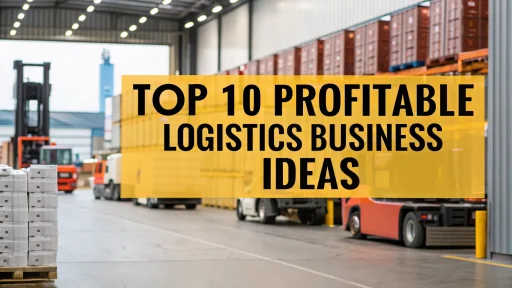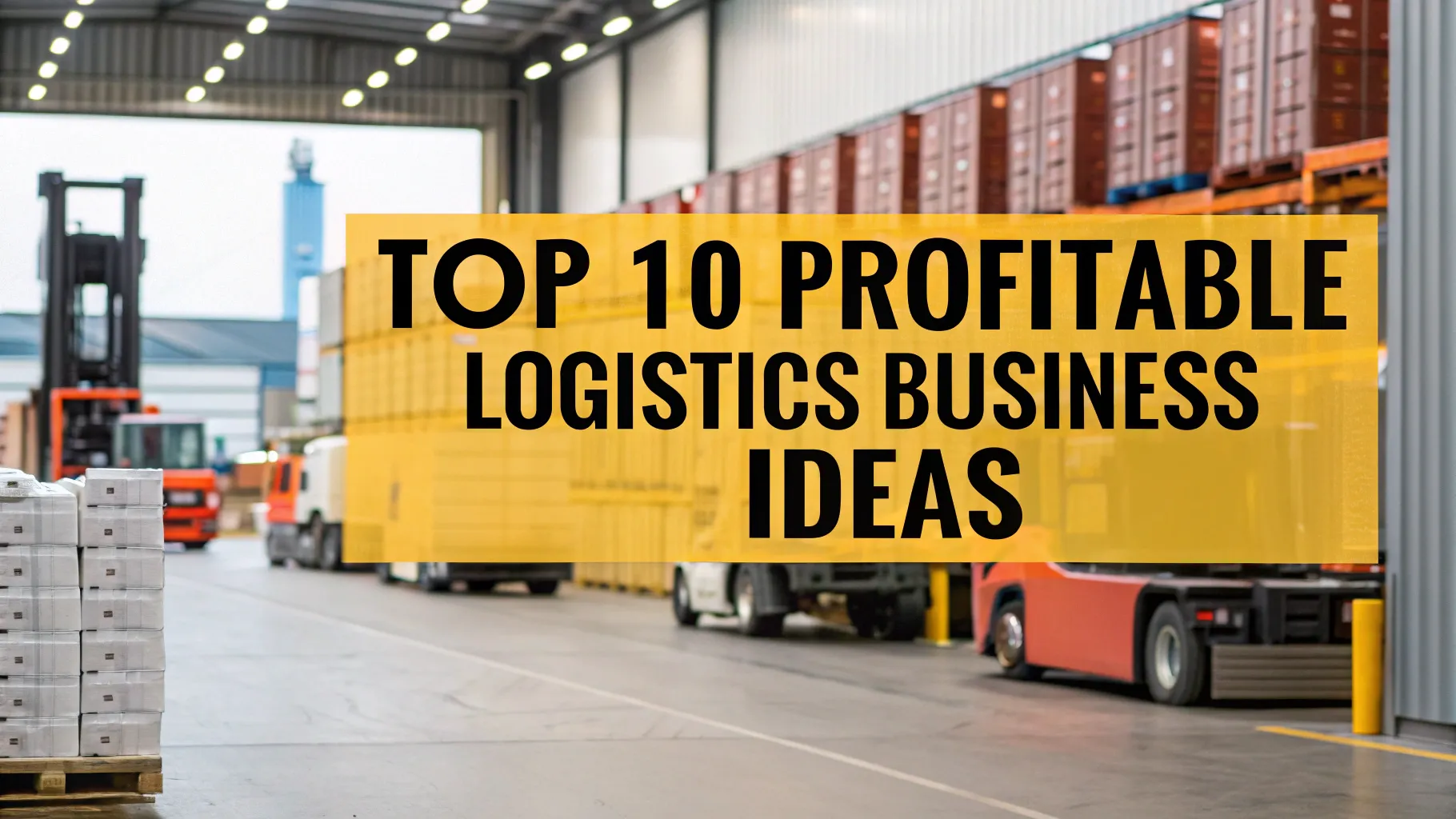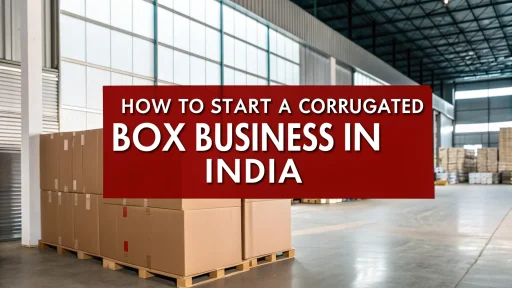Introduction
Logistics business Ideas, The industry of pharmaceuticals in India has experienced a rapid growth in the last decade, becoming a major center for active pharmaceutical ingredients (API) as well as intermediate production. In the wake of a rise in domestic demand as well as expanding export markets and initiatives of the government like The Production Linked Incentive (PLI) scheme and the Production Linked Incentive (PLI) scheme, the API industry is set to see an average annual rise (CAGR) of between 8 and 10 percent until 2030.
However, even the most efficient factories are not able to thrive without strong logistical support. From temperature-controlled warehousing to last-mile delivery, logistics startups play an indispensable role in ensuring that sensitive raw materials and finished drugs move seamlessly through the supply chain. For those who are interested in the logistics of pharmaceuticals, there are the Top 10 Logistics Business ideas, each one designed to capitalize on new market trends and offer essential benefits in the form of API and intermediate producers.
Market Forecast, Demand, and Growth
The market for Indian pharmaceutical logistics was estimated at around $ 3.5 billion by 2023. The market is expected to grow to nearly 6 billion dollars in 2030 and growing at a rate of 8.5 percent. Temperature-controlled logistics, often referred to as cold chain, accounts for nearly 40% of this market due to the stringent storage requirements of APIs and biologics. In addition, the e-pharmacy sector, driven by the growth of internet usage and shifting consumer habits has triggered demand for last-mile solutions specifically designed for medical supplies. As the regulatory frameworks tighten on the Good Distribution Practices (GDP) and sustainability for the environment, specific services like hazardous goods transportation and reverse logistics are beginning to gain momentum. This changing landscape is the perfect opportunity for new startups that combine technology and domain expertise to solve complex problems.
Related: 7 Business Ideas for Startups that can make you Money
Why Logistics Startups Matter for API & Intermediate Manufacturing
Pharma components are prone to temperature variations or moisture levels, as well as contamination. A small defect in the integrity of the cold chain can make a batch unusable, which can result in losses of multiple crores and the potential for injury to patients. Beyond physical handling the traceability and conformity to the regulations such as WHO-GDP, are mandatory. Startups that provide end-to-end transparency, data-driven insights and flexible solutions while keeping costs low will become essential partners for API producers. Furthermore as India increases its capacity, domestically integrated logistics systems that can reduce lead times and eliminate wastage will be competitive advantages.
Top 10 Logistics Startup Ideas for Business in India
1. Cold Chain Logistics for APIs and Biologics
The cold chain is the core of the pharma logistics. Startups can establish temperature-controlled warehouses equipped with smart monitoring systems that trigger alerts if temperatures deviate from set thresholds. The demand is growing with the increase in advanced APIs and biologics as well as the market for cold chain predicted to expand by 12 percent through 2030. The typical operation includes inspection of intakes of raw materials as well as condition-controlled the storage of cold rooms in modular configurations, monitoring in real-time using IoT sensors, and temperature-controlled delivery to manufacturing facilities or distributors.
2. Warehouse Management and Value-Added Services
Beyond the basic storage requirements pharmaceutical ingredients typically require special handling, such as nitrogen blanketing, humidity control and inert gas packing. Logistics startups can stand out by offering customized value-added services in its warehouses. Entrepreneurs are able to integrate Warehouse Management Systems (WMS) that can automate the process of slotting, selecting and cross-docking, cutting down on the time spent in the warehouse. As warehouse costs comprise around 20% of the total pharmaceutical logistics costs, a successful WMS deployment can provide significant savings as well as reliability in service.
3. Last-Mile Delivery for Pharma Ancillaries
Clinical research and e-pharmacies are increasingly requiring rapid, secure supply of everything from excipients to the reagents for trials. A specialized last-mile startup can utilize temperature-controlled vans, route optimization algorithms, and app-based tracking to guarantee delivery within predefined time windows. With the national healthcare logistics industry expected to increase by 10% annually, possibilities are plentiful in metropolitan cities as well as Tier II hubs alike. The operational plan of action includes centralized dispatch centers and vehicle loading dependent on stability profiles of batches and proof of delivery captured through digital signatures.
4. End-to-End Freight Forwarding Services
Exports of Indian pharma products — worth more than USD 24 billion by 2024 – rely on a reliable freight forwarding service that is able to navigate complex customs regulations as well as multimodal transportation. Startups in this sector could provide integrated sea, air as well as road-based freight services, which are complemented with regulatory advisory assistance. Through joining to global logistics network and using digital booking platforms, an organization can improve the process of consolidating cargo, preparing documents and tracking for API exporters that target North America, Europe, and emerging markets in Asia.
5. Temperature-Controlled Packaging Solutions
Packaging is the initial protection against temperature fluctuations. Startups can develop innovative insulation of containers including phase-change materials and panels of vacuum insulation that can maintain temperature levels over extended time. As packaging is a significant contributor to 15 percent of the cost of cold chain design solutions that lessen dependence on active refrigeration or dry ice will yield both financial and environmental advantages. A simple process includes designing and consulting on packaging as well as custom container fabrication, pre-conditioning inserts and a post-shipment validation report.
6. Specialized Hazardous Goods Transportation
A large number of API intermediates have been classified dangerous materials that must be in to be in compliance to ADR (Europe), IMDG (marine) as well as IATA/ICAO (air) regulations. A designated hazardous goods transporter can invest on certified equipment, skilled personnel and digital manifests to guarantee the integrity of chain-of-custody. This service is highly sought-after and commands premium prices due to the high risk and expertise set that is required. The process involves the risk assessment prior to shipping and verification of packaging approval from regulatory authorities, as well as emergency plan of action.
7. Digital Freight Marketplace for Pharma Logistics
Digitalization is changing the way procurement companies do business. Marketplace platforms allow for connecting API manufacturers with verified warehouse operators, transporters along with fulfillment providers. With the help of real-time pricing and capacity analytics, as well as contracts management capabilities, this platform will cut tendering processes manually from days to a few minutes. Indian logistics markets have seen an increase of 2-3 times over the past year; a focused on pharma can bring more efficiency and increase the compliance of documents with integrated repository.
8. IoT-Enabled Supply Chain Monitoring
Data visibility is crucial for making informed decisions. Startups that install IoT sensors in storage facilities and shipping containers can collect temperatures and humidity, vibration and location information in real-time. Advanced analytics and prescriptive alerts, aided by machine learning – can prevent potential spoilage risk. As regulatory agencies are increasingly demanding electronic Batch Release documents, IoT-driven audit trails make startups indispensable technology partners.
9. Reverse Logistics and Waste Management
Pharma manufacturing creates leftovers, expired APIs and packaging waste that requires recycling or disposal that is compliant. A reverse logistics company offers pick-up services as well as segregation as well as coordination with authorized incinerators or recyclers of hazardous waste. Beyond compliance with regulations, circular economy strategies like solvent recovery and sterilization of containers — are getting more attention. This sector is predicted to expand at a rate of 9% until 2030 due to corporations’ ESG commitments.
10. Integrated E-Commerce Logistics for Pharmaceutical Supplies
The rapid growth of the internet-based B2B procurement of excipients, laboratory reagents, and packaging materials creates an opportunity for profit. Startups can develop complete logistics solutions that include real-time inventory updates and drop-shipment capabilities, as well as D2C (direct-to-customer) delivery of orders. Through integrating with the top ERP systems and e-commerce platforms utilized by mid-sized API producers Startups can cut down the time from order to delivery from weeks to a few days.
For more information, check out this video
Operational Excellence: Key Process Considerations
Although each model of logistics is unique, some process elements are the same for all models:
- Intake and Quality Inspection
When materials are received, whether raw APIs or packaged, the initial quality inspections verify temperatures logs, certificates of analysis, as well as packaging quality. Digital tagging and automated scanning make it easier to trace. - Storage and Segregation
Materials are kept in zoned areas (ambient chilled, freezing dangerous). Warehouse bins and racks are tagged and access controls make sure only trained workers handle the fragile items. - Order Processing and Dispatch
After confirmation of an order after confirmation of order, after confirmation of the order, WMS indicates batch-specific handling guidelines. Lists of picking created by the system reduce the chance of human error, and RFID tags or barcodes validate the items in packaging stations. - Transportation and Tracking
Multi-modal transport plans are able to balance cost efficiency, speed, and regulatory. Live GPS along with environmental sensors transmit data to a central dashboard, which allows the management of exceptions and performance analysis. - Delivery and Confirmation
End-users–manufacturing plants, research labs, or distribution centers–receive digital proof-of-delivery with timestamped photos or electronic signatures. This is the final step in this loop of traceability. - Regulatory Compliance and Documentation
Every transaction produces auditable documents: Bills of Lading, cold chain temperature logs and hazardous goods manifests along with GDP certificate. Cloud-based document management facilitates audits and customer queries.
Actionable Insights for Entrepreneurs
- Niche Focus: Carve out specialized verticals–such as temperature-sensitive biologics or hazardous intermediates–to command premium margins and build defensible expertise.
- Technology Integration: Make investments in IoT and AI-driven analytics and cloud-native technologies right from the start. Operations data drives continual improvement and helps build confidence in the client.
- Partnership Ecosystem: Work with technological suppliers, regulatory consultants and equipment suppliers. Strategic alliances help accelerate roll-out of services and expand the scope of solutions.
- Sustainability and ESG: Differentiate by offering green logistics options–solar-powered cold rooms, reusable packaging, and solvent recycling services–to meet corporate and regulatory sustainability targets.
- The Compliance As A Service Provide complete compliance assistance from GDP certification readiness through hazardous waste licensing to simplify the process for API manufacturers.
Which business to start? How to choose a business idea?
Key Takeaways
The burgeoning API manufacturing sector and the ever-changing demands of pharmaceutical logistics creates an unbeatable opportunity for new companies. Utilizing domain knowledge as well as cutting-edge technology and a constant emphasis on sustainability and compliance entrepreneurs can create logistics businesses which not only generate profit but also support the expansion in India’s industry of pharmaceuticals. It doesn’t matter if you specialize in cold chains, digital marketplaces or transport of hazardous goods The key is providing customized, complete solutions that meet the rigorous demands from API or intermediate manufacturing.
Begin this journey by establishing a clear and concise operational plan as well as strategic partnerships and a dedication to excellence, and you’ll be on your path to revolutionizing the logistics of pharma in India.
About Niir Project Consultancy Services (NPCS)
Niir Project Consultancy Services (NPCS) provides a comprehensive Market Survey cum Detailed Techno Economic Feasibility report for many different industries. The reports provide a detailed study of the production procedure, raw materials, plant layout as well as financial forecasts. NPCS aids entrepreneurs in assessing the possibility of establishing new ventures in the field or expanding their existing business.






